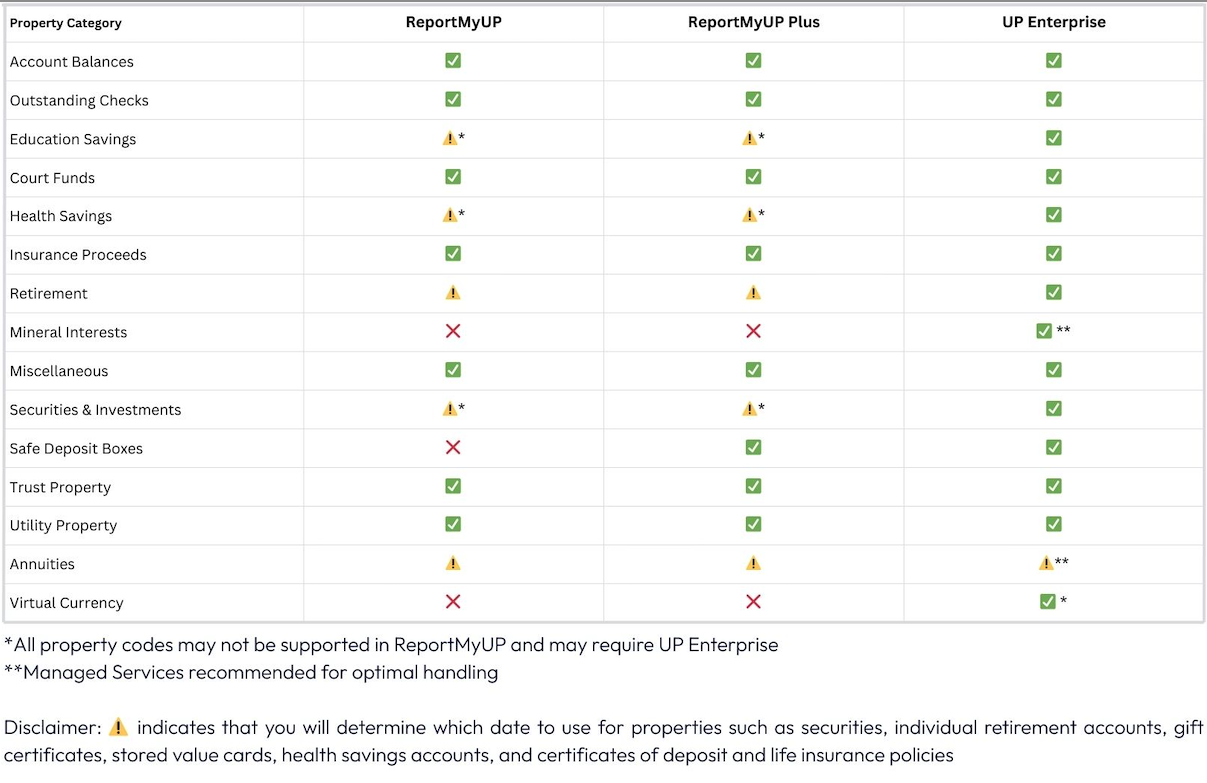Frequently Asked Questions
Is ReportMyUP a cloud-based software or do I download it?
ReportMyUP is completely cloud-based, allowing for real-time updates of unclaimed property regulations, ensuring your business is always in complete compliance and keeping your data secure.
Can different users have varying levels of security access in ReportMyUP?
In ReportMyUP, all three users are granted admin-level access, allowing them to complete every step of the unclaimed property reporting process. Each property record includes a detailed audit trail that logs who performed each action and when.
ReportMyUP Plus expands access to up to 5 users and offers flexible permission levels—including read-only, basic, and admin roles—to better align with your team’s responsibilities.
Can I create my own user-defined fields for internal reconciliation purposes using ReportMyUP?
ReportMyUP does not support creating custom user-defined fields. However, we provide the ability to download all fields, including the unique Source System ID field, to help reconcile internally. If your process is a bit more complex and requires custom fields, you may want to check out Unclaimed Property Enterprise.
Can I generate custom reports with ReportMyUP?
ReportMyUP offers custom reporting capabilities through a download feature. Use the advanced filter to identify the properties you need to create custom reports for, then download them for all your internal reporting needs.
Can I transfer historical data from another system into ReportMyUP?
Yes, ReportMyUP allows reported items to be imported as archived. into a record archive with our import template that allows you to map your data from another system or provider into ReportMyUP.
Can I import data from our existing spreadsheets or accounting system?
Yes! ReportMyUP offers an easy-to-use import template that accepts data from Excel or CSV files, making it simple to transfer property records from your existing systems.
What types of property can ReportMyUP track?

What states does ReportMyUP create reports for?
ReportMyUP creates reports for all 50 states. Sovos is the only provider in the market today that has developed an unclaimed property reporting network that allows you to submit your reports to more than 30 states directly from the ReportMyUP software. For the remaining states, ReportMyUP generates all necessary documents and the NAUPA file required for reporting. Customers are responsible for submitting these reports via state websites or by mail. All necessary links and instructions are provided on ReportMyUP's Compliance Resources page. Payment is always handled outside of ReportMyUP.
Does ReportMyUP offer different plans?
Yes. ReportMyUP is available in two plans: ReportMyUP and ReportMyUP Plus. Both include full access to core features. ReportMyUP Plus offers additional capabilities, including support for more property types (*safe deposit boxes), access for up to 5 users with role-based permissions, and the ability to file for up to 5 FEINs.
Not sure which plan is right for you? Visit our pricing page to find the best fit for your business.
*Available fall 2025
Does Sovos offer Unclaimed Property Managed Services or Consulting?
Yes! Sovos offers a variety of solutions and services for unclaimed property, including consulting and managed services. Head to our Managed Services page to learn more.
Does ReportMyUP offer a free trial?
Yes! You can try ReportMyUP free for 7-days!
What can I do during my free trial?
The free trial allows you to explore ReportMyUP features risk-free. During the trial, you can import properties, which will be analyzed and updated with Sovos’ market-leading compliance validating, including dormancy calculations.
You’ll have access to all of ReportMyUPs’ property management tools and compliance resources, helping you organize and manage your properties in preparation for due diligence and state reporting. While compliance outputs like state reports and due diligence letters aren’t included in the trial, they can be completed anytime with a paid subscriptions.
Can I cancel during my free trial?
You can cancel the trial at any point during the 7-day period in the product by going to Settings > Billing > Subscription Details > Cancel Subscription > Confirm Cancellation . Your credit card will not be charged until the trial is completed, or you move to a paid subscription by completing a reporting or due diligence process.
What payments are accepted?
ReportMyUP can be purchased via credit card or ACH payment.
What happens if I need to change my subscription?
Not a problem. This can be done directly through ReportMyUp or by contacting support.
What happens if I go over my subscription volume?
No worries. To ensure that you do not miss a deadline, ReportMyUP will not stop you from processing over your contracted volume. Property records over your subscription volume will be billed at your per record subscription price to the credit card on file.
Can I cancel my subscription?
You can cancel your ReportMyUP subscription at any time during your 12-month subscription period. No refund will be issued for already billed subscriptions. You will continue to have access to the software until the end of your subscription term.
Can I get my data if I cancel my subscription?
Yes. You can download your property data and any time during your active subscription or by logging in within 30 days of your subscription end date and clicking Download all files.
Do you offer different pricing packages for small vs. large businesses?
Yes. ReportMyUP offers pricing tiers to ensure you pay for only what you need. Head to our pricing page to find the best plan to fit your business.
How does ReportMyUP help us manage unclaimed property across different states and territories?
ReportMyUP maintains up-to-date state rules and thresholds in the system, automatically applying the correct formats and requirements for each jurisdiction where you need to file.
How does the system handle the electronic filing process?
ReportMyUP generates NAUPA-compliant electronic files for direct submission to state authorities, with one-click filing functionality for over 30 states and clear guidance for manual submissions where required.
How does electronic reporting of unclaimed property work?
Sovos' unclaimed property network allows you to submit electronically reports to 30+ states direct in ReportMyUP. When your reports are created, you will have the option to submit reports electronically for applicable states. Once the reports are submitted, we'll give you detailed instructions on escheatment processes.
Can ReportMyUP show only the items currently reportable once my data is in the system?
Yes, ReportMyUP offers several ways to filter and view your imported data including a quick filter for reportable items. It also provides more advanced filtering to create custom reports designed to suit your accounting needs.
Does ReportMyUP include a list of dormancy periods by state?
Yes, this information is available on the Compliance Resources page in ReportMyUP where you can search by state for details such as due dates, dormancy, and address information.
Can I track which properties have already been reported versus those still pending?
Yes! ReportMyUP includes built-in status tracking fields, allowing you to quickly identify which properties have been reported, which are in due diligence, and which are pending for upcoming filing deadlines.
Can I track the reporting status of different property records?
Yes! ReportMyUP includes built-in status tracking fields, allowing you to quickly identify which properties have been reported, which are in due diligence, and which are pending for upcoming deadlines.
Can I track the status of each property record in the reporting process?
Yes! ReportMyUP includes built-in status tracking fields, allowing you to quickly identify which properties have been reported, which are in due diligence, and which are pending for upcoming deadlines.
Can I see a history of our past filings for reference?
Absolutely. The system maintains a complete history of all submitted reports, giving you quick access to past filings for audit preparation or reference purposes.
Can I maintain a record of previously reported properties?
Absolutely. The system maintains a complete history of all submitted reports, giving you quick access to past filings for reference or audit purposes.
Does ReportMyUP show what has been reported in the past?
Yes, ReportMyUP includes a properties archive where you can filter for items in a reported status. Items automatically move to the archive as reported when a state report is finalized.
Can I see which properties are approaching reporting deadlines?
Absolutely. The system includes built-in deadline tracking, alerting you to upcoming due dates and helping you prioritize your reporting activities.
Can I see the history of previously filed reports?
Absolutely. ReportMyUP maintains a complete history of all submitted reports, giving you quick access to past filings for audit preparation or reference purposes.
Can the system help us track which properties need due diligence notifications?
Yes! ReportMyUP maintains current state requirements for due diligence thresholds, helping you identify which properties require owner notification and tracking your compliance efforts.
Can ReportMyUP help us with the due diligence notification process?
The system tracks state-specific due diligence requirements and thresholds, helping you identify which properties require owner notification and maintaining records of your compliance efforts.
Does ReportMyUP tell me when properties are due?
Yes, ReportMyUP will calculate the due date for each of your property records when they are added to the system. Any property that calculates with a future due date will remain in the system until its applicable deadlines.
Does ReportMyUP offer a reminder service to notify us of state deadlines?
Yes, email reminders are sent to ReportMyUP customers as peak filing seasons approach. ReportMyUP also features a timeline displaying important upcoming dates on the Dashboard.
Do all states require due diligence letters to be sent?
Yes, each state has its own specific due diligence requirements. ReportMyUP ensures these requirements are met with a standard due diligence template compliant with all states.
Can I import a pre-existing due diligence letter template we already use with ReportMyUP?
With ReportMyUP, we maintain a standard due diligence letter template compliant with all states so there is no need to add your own.
Can Sovos manage due diligence mailings for me?
ReportMyUP is designed to be a self-service offering that helps you generate standard due diligence letters you can mail on your own. If you need help with processing your due diligence mailings, Sovos offers that service among others with our Unclaimed Property Enterprise software.
How does ReportMyUP help with the due diligence process?
The system tracks due diligence requirements by state, helping you identify which properties require owner notification before reporting and maintaining records of your compliance efforts.
How does the system simplify reporting for companies with obligations in multiple states?
ReportMyUP generates NAUPA-compliant electronic files for each jurisdiction from a single data source, with one-click filing capability for over 30 states and clear guidance for manual submissions where required.
How does the reporting process work for multiple states?
ReportMyUP maintains up-to-date state rules and thresholds in the system, automatically applying the correct formats and requirements for each jurisdiction where you need to file.
How does ReportMyUP handle the different reporting requirements across states?
ReportMyUP maintains up-to-date state rules and thresholds in the system, automatically applying the correct formats and requirements for each jurisdiction where you need to file.
How does the system help me track which properties need to be reported to which states?
Our software includes built-in fields for tracking state-specific information, allowing you to filter and organize properties by jurisdiction, reporting status, and upcoming deadlines.
Does ReportMyUP produce reports for all states?
Yes, ReportMyUP generates reports for all states as well as New Brunswick, Alberta, Guam, Puerto Rico, and the U.S. Virgin Islands.
Does ReportMyUP manage preliminary reporting for CA and PR?
Yes, when generating a report for CA or PR, you will be prompted to specify the type of report you want to create. Only items included in a preliminary report will be pulled onto the CA or PR final reports.
Does ReportMyUP directly submit reports to the states?
Sovos is the only provider in the market today that has developed an unclaimed property reporting network that allows you to submit your reports to more than 30 states directly from the ReportMyUP software. For the remaining states, ReportMyUP generates all necessary documents and the NAUPA file required for reporting. Customers are responsible for submitting these reports via state websites or by mail. All necessary links and instructions are provided on ReportMyUP's Compliance Resources page. Payment is always handled outside of ReportMyUP.
How does ReportMyUP allow me to edit unclaimed property information?
Our flexible system allows you to easilym ake changes to individual or bulk records, making it easy to maintain appropriate organization while preparing jurisdiction-specific reports.
Can I modify my property’s TIN in ReportMyUP?
Yes, ReportMyUP allows individual properties to be added, reviewed, and updated at any time. Items that have been archived can only be partly modified to ensure the integrity of the reported data.
Can ReportMyUP perform bulk updates on properties already in the system?
Yes, ReportMyUP allows updates to be imported in bulk that will modify the already existing matching properties. New properties can be added, and updates to existing property records can be made in the same import file.
Does ReportMyUP require specific data fields for importing?
Yes, there are mandatory data fields required by states to be included in a report. ReportMyUP requires a minimum set of fields for all properties and then there are state-specific fields required under certain conditions. Our data import template can help you determine which data fields are necessary and our automated data validations can help identify missing or incorrect data during import or manual entry.
What is unclaimed property and why does my business need to report it?
Unclaimed property refers to financial assets that have been abandoned or forgotten by their owners. Examples include uncashed checks, dormant bank accounts, unused gift cards, and unclaimed wages. Businesses need to report these assets to state governments after a certain period of inactivity (usually 3-5 years). It's a legal requirement in all states, and failure to comply can result in penalties and interest.
What is escheatment?
Escheatment is the process of transferring unclaimed or abandoned property to the state.
What must I report?
Any amount owed to a third party constitutes potential unclaimed property that must be reported to comply with state escheatment requirements. Unclaimed property typically originates from transactions where cash flows into (e.g., accounts receivable) or out of (e.g., vendor or payroll disbursements) any organization or business.
Why should I report unclaimed property?
It is the law to report unclaimed property and fulfill escheatment requirements in every state and U.S. territory. Failure to comply can result in significant interest and penalties. These laws have existed for decades, and states actively enforce them through their audit staff and, in some cases, contracted auditors. Contract auditors are not bound to a single state, and if they find any issue in one state, they may open a multi-state audit of every state where your business has property holders. This can be a very time-consuming and expensive process to manage and lead to expanded penalties and interest liabilities.
How do I know if my business has unclaimed property to report?
Unclaimed property reporting obligations are based on the last known address of the rightful property owner, so this is determined by data. ReportMyUP analyzes all of your data and reports following guidelines required by each jurisdiction.
How often do businesses need to file unclaimed property reports?
Most states require businesses to file unclaimed property reports annually. Reporting deadlines vary by state, but many have due dates in the fall (October/November). Some states have different deadlines for different types of businesses or property.
Which states require unclaimed property reporting?
All 50 states, the District of Columbia, Puerto Rico, Guam, and the U.S. Virgin Islands have unclaimed property laws requiring businesses to report abandoned property. Each jurisdiction has its own specific requirements, dormancy periods, and reporting deadlines.
What happens if I don't comply with unclaimed property laws?
Non-compliance can result in penalties, interest charges, and potential audits. Penalties can include fines per day of non-compliance and interest on the value of unreported property. Some states may assess penalties of up to $100-$200 per day of violation, which can add up quickly.
What should I do if my business has never reported unclaimed property?
If you have never reported unclaimed property, you are likely to have past-due items to report. UP Standard will automatically include any past-due items on the next state report along with your current-due items. However, filing past-due items could lead to interests and penalties, so while a software solution may allow you to develop a documented process and start reporting, it may not be the only solution you need. Sovos offers a variety of services and even consulting if needed to help you document your policies and procedures, and to support an audit. For more information on these services please visit our Unclaimed Property Consulting page.
Where can I find information on individual state escheat/unclaimed property laws?
The National Association of Unclaimed Property Administrators (NAUPA) is an organization comprised of state agency directors. On its homepage at www.unclaimed.org, you will find links to resource pages for each state and U.S. territory, detailing their specific requirements for reporting unclaimed property. UP Standard also includes a link to each state’s unclaimed property website through the Compliance Resources page.
Can I manage escheat/unclaimed reporting internally?
Yes. However, many companies find it challenging to navigate the complexities of state laws, which vary widely and change frequently. There are also efficiency concerns with managing due diligence requirements, record retention, and other technical aspects. Therefore, it is beneficial to leverage a system that helps you stay current, streamline processes, and ensure the accuracy of your compliance reporting. A spreadsheet is not a good way to try and manage this process.
How does ReportMyUP keep up with changing state requirements?
Our team regularly updates the system with the latest state rules, thresholds, and filing requirements, ensuring your reports always comply with current regulations without requiring manual research or updates.
How does ReportMyUP help us stay current with state requirements?
Our system is regularly updated with the latest state rules, thresholds, and filing requirements, ensuring your reports always comply with current regulations without requiring manual research.
How do I know that ReportMyUP is current with state requirements?
Sovos has a dedicated Regulatory and Compliance team that monitors all introduced, pending, and passed legislation pertaining to unclaimed property. Our team works together to interpret the new requirements which are then implemented by our software development team on a bi-weekly basis.
What happens to my data in ReportMyUP if a state’s dormancy changes?
State dormancy changes frequently and when it does, we make sure to recalculate the due date on any properties in ReportMyUP when we publish the new dormancy information to our Compliance Resources.
Unclaimed Property, Simplified - Get started free today.




